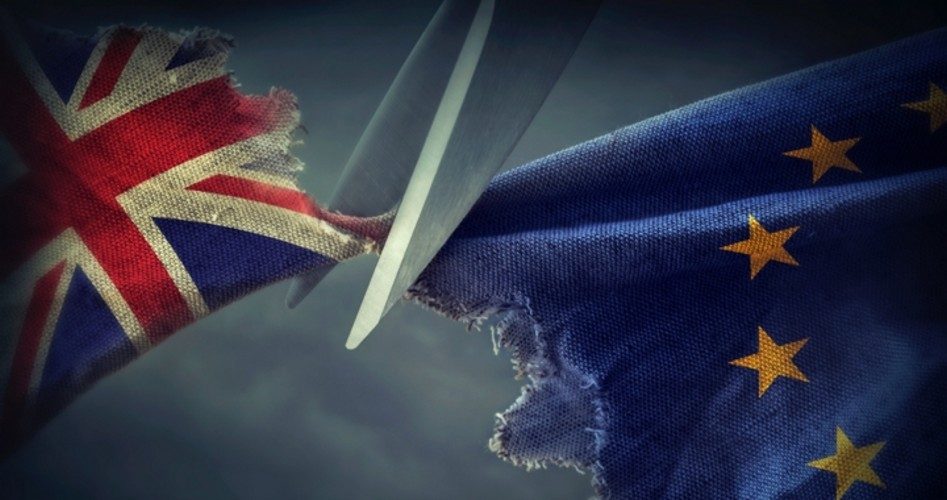
When Great Britain voted back in 2016 to leave the European Union, its citizens probably thought it was, more or less, a done deal. Certainly, there would be some political wrangling, some hand wringing, some acrimony — but, it couldn’t be worse than the fight on the referendum itself. Ultimately, the English population wanted to take their country’s sovereignty back.
Who knew that the globalists in charge of the EU and those in Britain itself would put up such a fight over it?
Prime Minister Theresa May has been tasked with the unenviable job of coming up with an agreement with the EU on the terms of Great Britain’s departure from the union. She has to walk a fine line between those in her own Conservative (Tory) Party, who believe she is giving far too many concessions to the European Union, the more liberal elements in Parliament who wish to remain in the EU, and the EU itself, which is insisting on concessions that would tie Britain closely to Europe with the same regulatory and legal frameworks that the British people voted to leave behind in the first place — what some in Britain are calling a “soft Brexit.”
Agreement or not, Great Britain is scheduled to leave the European Union on March 29 of next year. The EU and some globalist Brits hope to muddy the waters enough to stop the exit and force another referendum on the issue — a referendum they believe the “remain” contingent can win.
There are some key events coming up that could decide the future of Great Britain as it relates to the European Union.
On October 29, the Chancellor of the Exchequer Phillip Hammond will present the government’s proposed budget first privately to the Cabinet and then publicly in the House of Lords. From there, the budget is debated for days and sometimes weeks. It is May’s job to shepherd the budget through Parliament. Currently, the Conservative majority depends on ten Members of Parliament (MPs) from Northern Ireland’s Democratic Unionist Party (DUP) for its majority.
As of now, the DUP is threatening to vote against any budget that threatens the status of Northern Ireland in the United Kingdom, which some claim that the current deal on the table — known as the Chequers Plan — currently does.
In addition to the DUP, more conservative elements in May’s own Tory Party may use the budget battle to push back against the Chequers Plan, arguing it concedes far too much to the EU.
If May loses the budget debate, it might trigger a vote of confidence in the British government, which could result in a leadership contest within the Conservative Party. This could force May out as prime minister. Either someone within her own party — someone such as pro-Brexit MP Boris Johnson, who resigned from May’s Cabinet in July over the soft Brexit plan — could be tagged as prime minister, or a new election could be called. Either way, the Chequers Plan would go up in smoke.
Should May survive the budget battle, she still needs to come to an agreement with the EU, and they have not been very agreeable to date. At a meeting in Salzburg earlier this month, French President Emmanuel Macron said of the Chequers Plan, “We all agreed on this today, the proposals in their current state are not acceptable, especially on the economic side of it. The Chequers Plan cannot be take it or leave it.”
Some in the EU believe they can stop Brexit or, at least, force a new referendum by using obstructionist tactics.
But there is some good news for May as on Friday, Angela Merkel of Germany and Macron insisted that the EU negotiator Michel Barnier be “more flexible” in negotiations with Britain, especially as it pertains to the cumbersome Northern Ireland issue. Barnier was reportedly told to offer Britain guarantees that it would not impose a customs border in the Irish Sea, the issue the aforementioned Democratic Unionist Party MPs in Northern Ireland were most concerned about.
Another formal summit on Brexit between the EU and Britain is scheduled for December. Both sides agree that this is probably the final deadline for a deal, as both the EU and Britain will need the next 3-4 months in order to push the deal in their respective parliaments.
So, Brexit is winding its slow, complicated way through the halls of Parliament in both London and Brussels. If the two sides fail to reach an agreement, then economic, security, and legal ties between the EU and Great Britain would cease immediately on March 30. Potentially, EU residents residing in Great Britain and vice-versa could be stranded until deals can be worked out. Planes could be grounded and goods could be stuck at the borders, unable to be delivered. The Chunnel might even be closed for a time until agreements can be worked out.
And we thought politics in the United States were complicated.
Photo: egal/iStock/Getty Images Plus



